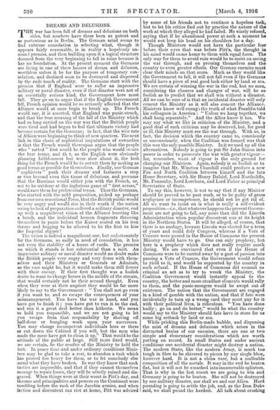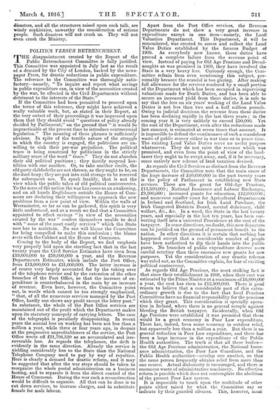DREAMS AND DELUSIONS.
111HE war has been full of dreams and delusions on both 1 sides, but nowhere have these been so potent and n o portentous as in Berlin. The German mind seems to find extreme consolation in selecting what, though it appears fairly reasonable, is in reality a hopelessly un- soun-I premiss, and then building upon it a logical structure doomed from the very beginning to fall in ruins because it has no foundation. At the present moment the Germans are living in one of these houses of dream and delusion, worthless unless it be for the purpose of temporary con- solation, and destined soon to be destroyed and dispersed by the rude touch okreality. The Germans start with the premiss that if England were to suffer an impressive military or naval disaster, even if that disaster were not of an essentially serious kind, the Government here must fall. They go on to argue that if the English Government fell, French opinion would be so seriously affected that the Alliance would at once begin to break up. The French would say, it is asserted, that England was panic-struck, and that the true meaning of the fall of the Ministry which had so long carried on the war was that the British people were tired and had begun to feel that ultimate victory had become certain for the Germans ; in fact, that the wise rats of Albion were beginning to think of new quarters. The next link in this chain of sophistical imputations of cowardice is that the French would thereupon argue that the people who " ratted " first would be the people who would secure the best terms, and th t, as the English were obviously planning faithlessness but were slow about it, the best thing for the French would be to outwit them by making as good terms as possible for themselves. Finally, our German sophisters " push their dreams and fantasies a step or two beyond even this tissue of delusions, and presume that the Russians would either join with the French, or, not to be outdone at the inglorious game of " first across," would race them for preferential terms. Thus the Germans, who started with the mild proposition, picked up perhaps from our own sensational Press, that the British public would be very angry and would rise in their wrath if the nation owing to lack of preparation suffered a military disaster, end up with a magnificent vision of the Alliance bursting like a bomb, and the individual human fragments throwing themselves in panic before the Kaiser seated on his iron throne and begging to be allowed to be the first to kiss the Imperial slipper !
The vision is indeed a magnificent one, but unfortunately for the Germans, so sadly in need of consolation, it has not even the stability of a house of cards. The premiss on which it stands is less substantial than a mist. An impressive military or naval disaster would no doubt make the British people very angry and very fierce with them- selves and their Ministers or Generals or Admirals, as the case might be, but it would make them still fiercer with their enemy. If their first thought was a foolish desire to want to change horses in the middle of the stream, that would certainly not be their second thought. Even when they were at their angriest they would be far more likely to say to the Government : " You shall not go even if you want to, and so escape the consequences of your mismanagement. You have the war in hand, and you have got to finish it ; you have got to run it to the end, and run it a great deal better than hitherto. We mean to hold you responsible, and we are not going to let you escape from that responsibility by shoving off half-done or bungling work upon your successors. You may change incompetent individuals here or there or cut down the Cabinet if you will, but the men who made the mess have got to clean it up." That would be the attitude of the public at large. Still more fixed would, we are certain, be the resolve of the Ministry to hold the fort. In peace time and under ordinary conditions Minis- ters may be glad to take a rest, to abandon a task which has proved too heavy for them, or to let somebody else mend what they have broken. In war they know that such tactics are impossible, and that if they cannot themselves manage to repair losses, they will be utterly ruined and dis- graced. When things were at their worst in Pitt's day, and thrones and principalities and powers on the Continent were tumbling before the rush of the Jacobin armies, and when faction and discontent ran riot at home, Pitt was advised by some of his friends not to continue a hopeless task, but to let his critics find out by practice the nature of the work at which they alleged he had failed. He wisely refused, saying that if he abandoned power at such a moment he would not keep his head on his shoulders for a day. Though Ministers would not have the particular fear before their eyes that was before Pitt's, the thought in his mind would co me home to them with equal force. The only way for them to avoid ruin would be to insist on seeing the war through, and on pressing themselves and the country to even greater efforts. Our German enemies must clear their minds on that score. Much as they would like the Government to fall, it will not fall even if the Germans should have a piece of real good luck either by land or sea. We are certain of winning the war in the end, but no man, considering the chances and changes of war, will be so foolish as to predict that we shall win without a disaster. All we can be sure of is that an incidental disaster will only cement the Ministry as it will also cement the Alliance. Ministers lmow well enouga the truth of what Franklin told his colleagues in America : " Unless we hang together, we shall hang separately." And the Allies lmow it too. We may say what we like in criticism of the Ministry, and a good deal of such criticism may be deserved, but, for good or ill, this Ministry must see the war through. With us, in fact, the decision which the country came to, consciously or unconsciously, when the Coalition was formed was that this was the only possible Ministry. In it we used up all the alternatives. Nobody is going to put Sir John Sinion into power in order to prosecute the war with greater vigour— for, remember, want of vigour is the only ground for changing our Ministers. Again, nobody is so foolish as to imagine that Mr. Winston Churchill could produce a new Fox and North Coalition between himself and the late Home Secretary, with Sir Henry Dalziel, Lord Northcliffe, Mr. Ponsonby, Lord Loreburn, and Lord Fisher as principal Secretaries of State.
To say this, however, is not to say that if any Minister should be proved to be past work, or to be guilty of gross negligence or incompetence, he should not be got rid of. All we want to insist on is what is really a self-evident proposition—i.e., that whatever happens the present Govern- ment are not going to fall, any more than did the Lincoln Administration when popular discontent was at its height in the Northern States. It will be alleged, of course, that there is no analogy, because Lincoln was elected for a term of years and could defy Congress, whereas if a Vote of Censure were passed in the House of Commons the present Ministry would have to go. One can only prophesy, but here is a prophecy which does not really require much daring. We are convinced that even if the House of Commons were to be carried away by a gust of passion into passing a Vote of Censure, the Government would refuse to yield to it, and would be supported by the country in such refusal. If the House of Commons did commit so criminal an act as to try to wreck the Ministry, the Coalition Government would instantly appeal to the country, the better and more steadfast elements would rally to them, and the panic-mongers would be swept out of existence. The notion that the Government are engaged in a kind of gamble with the nation, and that if fate were incidentally to turn up a wrong card they must pay for it with their political lives, is ridiculous. " You have done badly ; go on and do better," would be what the country would say to the Ministry should fate have in store for us some big setback by land or sea.
While pricking this Berlin-made bubble, and dispersing the mist of dreams and delusions which arises in the distracted brains of our enemies, there are one or two simple and elementary considerations which are worth putting on record. In small States and under ancient conditions one accidental disaster might destroy a nation. The modern State, like the modern Army, is much too tough in fibre to be shivered to pieces by any single blow, however hard. It is not a china vase, but a malleable composition of all the metals. It may in the end be beaten flat, but it will not be smashed into innumerable splinters. That is why in the last resort we are going to win and Germany is going to be beaten. She will not be destroyed by one military disaster, nor shall we and our Allies. Hard. pounding is going to settle the job, and, as the Iron Duke said, we shall pound the hardest. All talk about crushing disasters, and all the structures raised upon such talk, are windy sophistries, unworthy the consideration of serious people. Such disasters will not crush us. They will not even crush the Ministry.



































 Previous page
Previous page